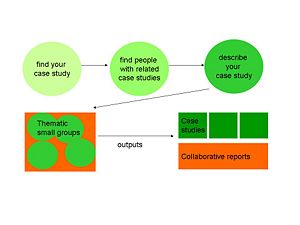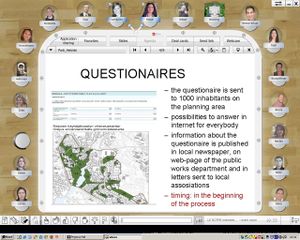Cultural Landscapes 2010
Seminar Focus and Concept
Cultural Landscapes: European Capitals of Culture / Metropolitan Regions “Ruhr” and “Istanbul”
The theme of the 2010 ECLAS Conference in Istanbul is ‘Cultural Landscapes’. Our international LE:NOTRE mundus online seminar picks up on this theme. We are inspired by the belief that wisely managed significant cultural landscapes - both designed and vernacular - are critical to sustaining the continuum of human history across generations. Protecting cultural values makes special non-renewable resources available to all people to benefit from and to appreciate human ingenuity, accomplishments, hardships, and hopes. From here, we also may gain insight that help in finding future land management and design solutions.
This seminar aims to introduce into the scope of the management and social inclusion of cultural landscapes in landscape and open space planning. Processes of sustainable management are part of virtually all development, planning and design procedures in metropolitan areas. Structuring, analysing, documenting and reflecting these procedures is a task all professionals need to do. In the course of this seminar, students will not only get to know the theoretical and instrumental framework. In addition, they will be asked to apply these methods to projects they know well.
Useful links:
Learning Objectives
- Insight and understanding of cultural landscape management frameworks in metropolitan areas.
- Skills to relate them to political and institutional situations (particularly to case studies), and to find future management and design solutions.
- Knowledge of processes and analytical methods applied to sustainable management and social inclusion in landscape planning and open space design.
- Skills to assess and apply tools such as presenting and visualising different interests, intentions, ideas, alternative concepts, plans and designs.
- Ability to structure, analyse and document a development, planning and / or design process with scope for sustainable management and social inclusion.
- Competence to select and apply techniques suitable for these processes, and critically reflect upon aims, content, process, tools and outcome of a planning / design project.
- Competence to work in an international (interdisciplinary) team.
- Skills to apply advanced internet-based technologies.
Seminar Structure and Contents
- Part A: European Capitals of Culture 2010 / Metropolitan Regions “Ruhr” and “Istanbul” (introductory lecture)
- Part B: Cultural Landscapes: Education, research methods and approaches (lecture and exercise)
- Part C: Responses of cultural landscapes to changing natural processes (expert reports)
- Part D: Landscapes as a reflection of changing cultural processes (expert reports)
- Part E: Technology as a driver of cultural landscape change (expert reports)
- Part F: Analysis of Relevant Case Studies (students apply methods to self-chosen cases)
- Part G: Reflection
for more details, please see:
Time Frame
- Meetings take place from April 20 - Juli 06, 2010, Tuesdays from 6.00 - 7.30 p.m. CET in the LE:NOTRE Virtual Team Room
- Your local time? See Time Zone Conversion
- Please make sure to log in 10 mins before official starting time for appropriate soundcheck so that we can start the session on time with particular respect to our external speakers!!!
Seminar Assignments, Requirements and ECTS
This seminar has a regular scope of 2 ECTS. Participants are expected to attend the plenary sessions on a weekly basis and to collaborate and communicate efficiently in small group work between online seminar sessions. The core assignments are:
- 1. Reading exercise: Developing a commented concept map of one of the Resources
Task: Each student chooses one of the listed articles (or any other relevant text) for the assignment. Individual presentations of concept maps take place in Vitero sessions during May and June, 2010 according to the respective thematic field. Each concept map is being published accordingly.
- 2. Minute exercise: Developing a commented concept map of one of the Expert Case Studies
Task: Small groups of 2-4 students develop concept sketches simultaneously to contributions by invited speakers. After a constructive group discussion in Vitero, these sketches are to be elaborated into commented concept maps until the following Vitero session. Short summary presentations take place in May and June, 2010 with respect to the thematic field. Each concept map is being published accordingly.
- 3. Publishing exercise: Developing an online report among Student Case Studies
Task: Each student chooses a familiar project and publishes an online report by means of the Case Study Template.
- 4. Analysing exercise: Developing a comparative analysis within your thematic group
Task: With regard to the thematic field, a comparative case study analysis is being developed in small group work. Online presentations of both individual case studies and the respective comparative analyses take place in Vitero sessions in June, 2010.
Note: Ultimate completion / improvement of all part assignments due to ECTS evaluation is expected until July 27,2010.
Target Group
- Advanced students of Landscape Architecture and related study fields (third year of Bachelor's program or Master‘s level) of LE:NOTRE/ LE:NOTRE Mundus member universities
- The course language is English. Efficient skills in both speaking and writing are being presumed.
- Good levels of independence and willingness to work in a group and to use the internet for communication are expected.
- Guests from the professional field are very welcome!
How to take part?
Interested students send a letter of intent by e-mail before April 20, 2010 to Ms. Heike Kaiser - email: hkaiser(at)asl-uni-kassel.de. Later registrations might be considered as well, but students should start in time to keep up with the overall process. Depending on the level of interest, places may be limited to one student per university. However, one student can act as a contact person for the seminar in case you want to participate as a university group.
Technological Requirements
- stable internet connection (DSL)
- PC or laptop with Windows operating system (or MAC with a different client)
- headset (microphone and earphones)
- registered participants will receive a link to the ViTeRo (Virtual Team Room) Program page for download
How to contribute as a speaker
If you are contributing as a speaker in one of the plenary sessions you will be asked to prepare for a 20 - 30 minute presentation in the form of a PowerPoint slideshow. Presentations are usually followed by a moderated discussion. Plenary sessions usually take 90 minutes (15 mins introduction, 30 mins presentation plus 30 - 45 minutes discussion).
Guidelines for presentations
Please consider the following aspects when you are preparing for a presentation:
- Please avoid written information on the slides except for the most essential statement and questions. As you will be talking synchronously to the audience there is absolutely no need to add much textual information on the slides.
- Please add many visuals and use the space given. You may not add a number of small images on one slide. Use several slides, each with one image.
- If you have questions to the audience (e.g. at the end in order to stimulate the discussion) you should visualise the question on the slide.
- Please send your presentation in good time to the seminar coordinator (at least two days before the meeting). We then have the chance to propose changes or additions in order to make your presentation more suitable for a virtual classroom setting.
Contact and Organisation
Dipl.-Ing MA sc. Heike Kaiser
University of Kassel
Department of Architecture, Urban Planning and Landscape Planning
Faculty of Landscape Planning / Land Use (Prof. Dr.-Ing. Diedrich Bruns)
email: hkaiser(at)asl.uni-kassel.de



